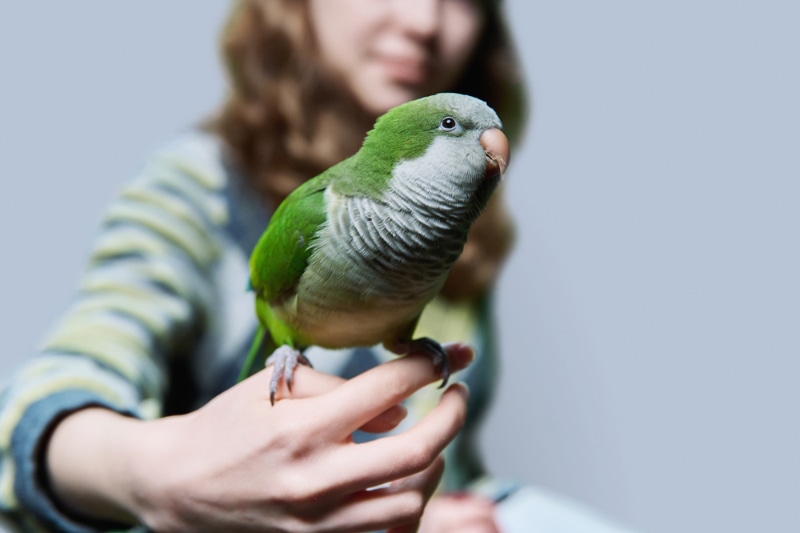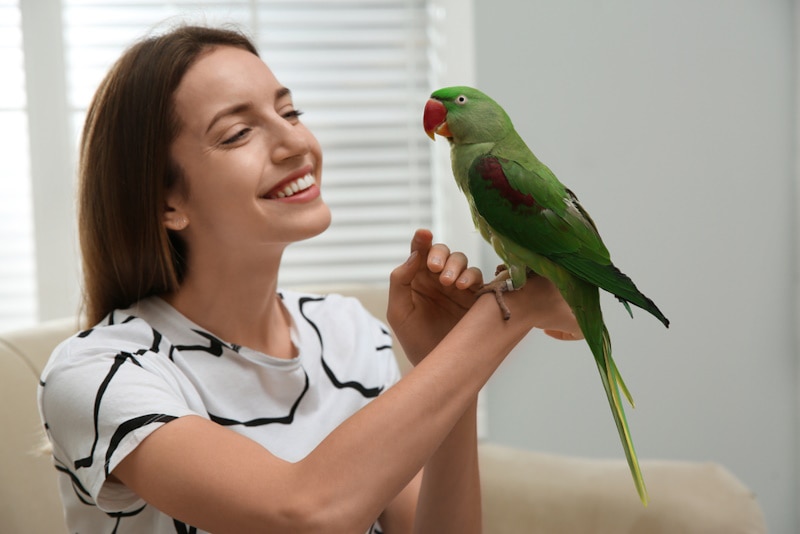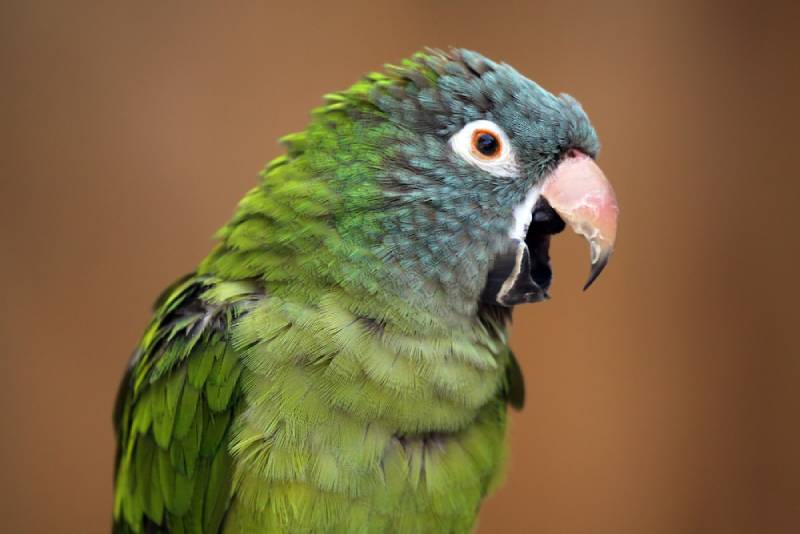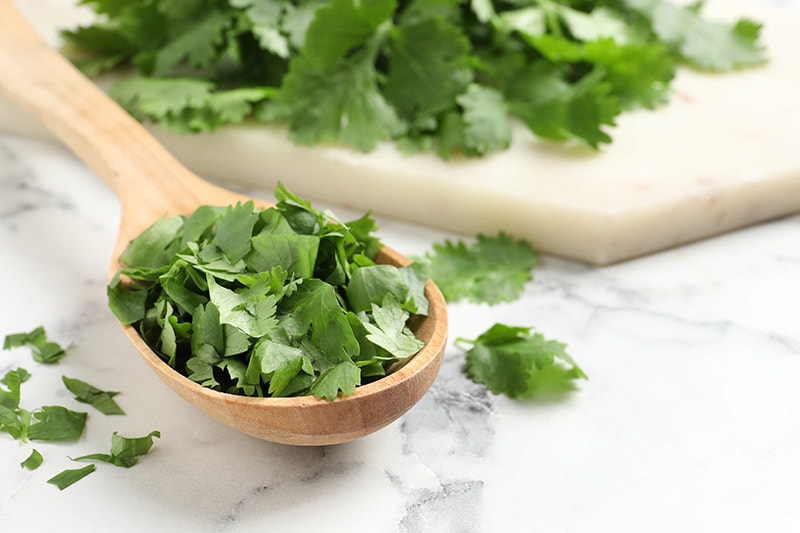Do Parakeets Like to Be Held? Vet-Approved Facts & Explanation
Updated on

Click to Skip Ahead
Part of owning a pet that brings us so much joy is petting and cuddling them. It’s been scientifically proven that cuddling a dog (or perhaps, any pet) reduces stress, increases sociability, and generally makes us feel good.
That brings us to birds—or parakeets, to be more specific. Do parakeets like being held?
This answer depends on several factors, including how the bird was raised and each individual parakeet’s preference. In general, you can’t hold or cuddle a bird the way that you can other animals. But there are still many ways to enjoy your time with your parakeet.
If you’re new to parakeet ownership and hope that they will enjoy receiving your petting and scratching, read on for tips that should help.
Do Parakeets Like to Be Held?
In the traditional sense of the word, no, parakeets do not like to be held. No bird will instinctively want to be held or cuddled—this is something foreign to them. But when a parakeet trusts you and with the right training, they may enjoy perching on your hand or shoulder.
Birds are not raised with human-style cuddling from their mothers, who instead make the nest warm and comfortable and feed them regularly. But paired birds do mutual grooming during courtship and mating. What this all means is that parakeets might enjoy pets and scratches from you if they think of you as a mate or if they have been hand raised.

Being Viewed as a Mate
Being viewed as a mate is less than ideal for you and your parakeet. They will be affectionate but may display jealousy toward anyone who comes near you.
Your parakeet will be dependent on you, and they will be quite lonely when you’re not around. It’s best to have another parakeet or discourage the hormonal behavior by redirecting them. When they start showing too much interest in you, distract your bird and move them to another location.
Hand Raising
Hand raising a parakeet is the best way to build a loving and trusting relationship with your bird. These parakeets will associate being touched by humans as comforting, maybe even mothering.
This will help encourage your bird to spend more time touching and perching on you, and they will look at this behavior as a positive rather than a negative thing. When birds are hand-raised by humans, they become quite comfortable with us and can adapt quickly to a new home.

Are There Ways to Tell If Your Parakeet Doesn’t Like Being Held?
Being familiar with your bird’s body language is essential to caring for a parakeet. This can give you an immediate grasp of whether you should leave them alone or if it’s okay to interact with them.
- Loud vocalizing: If your parakeet starts shrieking and doesn’t seem inclined to stop, they are very upset.
- Puffed feathers and eye pinning: Eye pinning occurs when your parakeet quickly dilates and constricts their pupils. When your bird starts eye pinning, puffs out their feathers, and is rigid, this is a defense mechanism and sign of aggression.
- Avoidance: If your parakeet avoids your hand and attempts to get away from you, it’s a clear signal that you should leave them alone.
- Biting: This is a clear sign that your parakeet is annoyed, though they might also be scared or angry. Using their beak is one of their best lines of defense.
It’s vital that you never grab your parakeet unless there’s an immediate threat. Birds will panic and try to escape, which can cause an injury and damage your relationship with your parakeet.
How to Bond With Your Parakeet
Bonding with your parakeet will help your training sessions. The stronger the bond, the more your bird will enjoy spending time with you.
- Spend time together: Parakeets are social birds and will enjoy spending time with you. This can be just sitting next to their cage—it doesn’t have to involve touching. If you need to get work done, do it next to the cage.
- Talk to them:While sitting with your parakeet, make a point of talking to them. They will get to know your voice, which will eventually become comforting for them.
- Train them:Training your bird is a great way to bond with them, and since it involves treats, this will go a long way toward building trust! Put food in your hand and hold it out for your parakeet. If they are not ready to take it from your hand, drop it and remove your hand.
- Offer your finger: When your bird starts taking food from your hand, slowly move your finger toward them to offer as a perch. Gently press your finger against their breast, which will encourage them to hop on your finger. Follow up with a treat.
- Be consistent:This is exactly what you need with practically everything, like children and dogs! While training your parakeet, you must be consistent; you can’t let them get away with something once and punish them the next time.
- Be patient:Along with consistency, you need patience. Some training will take time, and individual birds will have their own pace.
- Provide quality general care:Do your research, learn what your bird should eat, set up their cage with appropriate toys, and keep it clean. Caring for your bird is one of the best ways to show them that you love them.
Just an FYI: If you’re home most of the time, you don’t necessarily have to get another parakeet, which will strengthen your bond with your bird. But if you’re away from home often, you should get your parakeet a companion.

How to Tell That Your Parakeet Trusts You
This comes down to body language. If you notice your parakeet doing any of the following, you should know that your bird trusts you:
- Seeking your attention and engaging with you
- Playing near or with you
- Whistling, singing, and talking
- Allows petting and scratching
- Grooming you
- Falling asleep near you
- Having open body language: turning their head to the side or bowing their head down for scratches
- Closing their eyes near you (this is a major sign of trust!)
Conclusion
The process of training and having your parakeet’s trust will generally take a while, but this also depends on your parakeet. Each bird is unique: Some might bond with you quickly, while others might need a bit of time. This is where your patience must come into play, even more so if your parakeet is a rescue. Remember to respect your bird’s boundaries and never force them to do anything.
If your parakeet doesn’t want to be touched by you, you’ll need to look for ways that they show that they love you. If you care for them and show them respect and love, they will definitely love you right back!
Featured Image Credit: New Africa, Shutterstock












